News
President Bola Ahmed Tinubu (right) presenting 2024 appropriation bill to joint National Assembly members at the Complex in Abuja
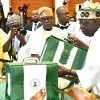
• Earmarks N9.92tr for non-debt recurrent expenditure
• N8.25tr for debt service, N8.7tr for capital expenditure
• PDP asks N’Assembly to reject ‘deceptive’ proposal
• As Akpabio, Abbas, Ibrahim, Adeola, others laud ‘realistic’ budget.
The 2024 budget proposal presented to the National Assembly drew praise and condemnation from a section of Nigerians, yesterday.
President Bola Tinubu said Nigeria’s national defence and internal security, local job creation, macro-economic stability, investment environment optimisation, human capital development, poverty reduction, and social security are some of the top priorities of the ‘Budget of Renewed Hope’.
Addressing a joint session of the National Assembly in Abuja, Tinubu said the nation’s internal security architecture would be overhauled to enhance law enforcement capabilities, with a view to safeguarding life, property, and investments across the country.
He said the proposed budget prioritises human capital development, with particular attention given to children, because human capital remains the most critical resource for national development.
“To improve the effectiveness of our budget performance, the government will focus on ensuring value for money, greater transparency, and accountability. In this regard, we will work more closely with development partners and the private sector.
“To address long-standing issues in the education sector, a more sustainable model of funding tertiary education will be implemented, including the Student Loan Scheme scheduled to become operational by January 2024,” the President said.
Speaking on the economy, Tinubu said a stable macro-economic environment is crucial in his administration’s bid to catalyse private investment and accelerate economic growth; hence, his government shall continue to implement business and investment friendly measures for sustainable growth.
“We expect the economy to grow by a minimum of 3.76 per cent, above the forecasted world average. Inflation is expected to moderate to 21.4 per cent in 2024. In preparing the 2024 budget, our primary objective has been to sustain our robust foundation for sustainable economic development. A critical focus of this budget and the medium-term expenditure framework is Nigeria’s commitment to a greener future,” he said.
The President said a conservative oil price benchmark of $77.96 per barrel and a daily oil production estimate of 1.78 million barrels per day were adopted after a careful review of global oil market trends, and that a naira to dollar exchange rate of 750 naira per dollar was adopted for 2024 as well.
Giving a breakdown of the 2024 Appropriation Bill, the President said: “An aggregate expenditure of 27.5 trillion naira is proposed for the Federal Government in 2024, of which the non-debt recurrent expenditure is N9.92 trillion, while debt service is projected to be N8.25 trillion, and capital expenditure is N8.7 trillion. Nigeria remains committed to meeting its debt obligations. Projected debt service is 45 per cent of the expected total revenue.
“The budget deficit is projected at N9.18 trillion in 2024 or 3.88 percent of GDP. This is lower than the N13.78 trillion deficit recorded in 2023, which represented 6.11 per cent of GDP. The deficit will be financed by new borrowings totaling N7.83 trillion, N298.49 billion from privatisation proceeds, and N1.05 trillion draw down on multilateral and bilateral loans secured for specific development projects.”
The President said his administration remains committed to broad-based and shared economic prosperity, adding: “We are reviewing social investment programmes to enhance their implementation and effectiveness. In particular, the National Social Safety Net project will be expanded to provide targeted cash transfers to poor and vulnerable households.”
But the opposition Peoples Democratic Party (PDP) described the budget as a huge disservice. It, therefore, called on the National Assembly, pursuant to its duty under Section 80, 81 and 82 of the 1999 Constitution, to reject the document as presented and use its legislative powers to disassemble it.
PDP warned that if the budget is allowed to pass, it will further asphyxiate citizens and plunge the nation into more economic depression and hopelessness.
The party also described claim by Tinubu that the presentation is a ‘Budget of Renewed Hope’ as “conjured, unfounded and deceptive”. It said: “The budget is completely devoid of concrete mechanisms to revive the economy, create jobs, address the comatose manufacturing and productive sectors, human capital development deficiencies and depleting life expectancy of Nigeria citizens.”
In a statement, yesterday, by National Publicity Secretary, Debo Ologunagba, PDP said: “The 2024 budget is filled with heavily padded figures, duplicated items and several false statistics, including claims of global increase in inflation rate as excuse for an impending excruciating increase in taxes and interest rate, to the detriment of our productive sector.
“It is clear that the 2024 budget as proposed, with its heavy provisions for luxury appetite of the Presidency and All Progressives Congress (APC) leaders, which is predicated and expected to be funded from multilateral and bilateral foreign loans and increased taxes on Nigerians – is designed to further mortgage our nation and strangulate already impoverished Nigerians.
The party added: “By adopting a defeatist N750 per dollar exchange rate, President Tinubu has further plunged our economy into the abyss, weakened our productive sector, wrecked the purchasing power of Nigerians and the capacity of the youths to be creative, recognising that it will be almost impossible for Small and Medium Enterprises as well as startups to access capital under such a suffocating budget.
“Every responsible leadership strives to work and defend its national currency. Unfortunately, the Tinubu-led government has surrendered our nation’s currency and pride to the whims and caprices of so-called “market forces”.
Also, in an interview with The Guardian, Executive Director of Human Rights Writers Association of Nigeria (HURIWA), Emmanuel Onwubiko, drew attention to recent revelation by the Debt Management Office (DMO) that Nigeria’s total public debt hit N87.38 trillion at the end of the second quarter of 2023.
He said: “To add to this embarrassing situation by approving such a massive borrowing plan is insane and absolutely unacceptable. We need to recall that the figure from the DMO represents increase of 75.29 per cent or N37.53 trillion, compared to N49.85 trillion recorded at the end of March 2023. The DMO, in that most recent report, said the debt includes the N22.71 trillion Ways and Means Advances of the Central Bank of Nigeria to the Federal Government.”
Meanwhile, delivering a speech before Tinubu presented the budget to the joint session, Senate President, Godswill Akpabio, praised the bond between the legislature and the executive, saying: “Never have we had so many bridges and connection points between these two arms of government. We will continue to walk hand in hand and see eye to eye with the executive arm, while ensuring that the principles of separation of powers as well as checks and balances, as enshrined in our Constitution, are observed in the overriding public interest.
He added: “The 10th National Assembly is fully aligned with the President’s dreams for our country. Our plans encompass comprehensive legislative actions that will contribute to nation-building, economic growth, and social development. Through strategic reforms, we aim to create an enabling legal environment for sustainable progress and growth.”
Similarly, Speaker of the House of Representatives, Abbas Tajuddeen, said: “It is a well-known fact that millions of our constituents are living through incredibly difficult times. For this reason, they also look to the Tinubu-led government to provide quick and sustainable solutions. The antecedents of the President and your track record in governance inspire a lot of hope in Nigerians.
“Mr. President, it is for this reason that we cannot afford to fail Nigerians. If anyone can change the rot and chart a new course for Nigeria, it is you. I have no doubt whatsoever that we can measure up to the expectations of Nigerians through your visionary leadership and the commitment of the National Assembly.”
Abass said the budget should not be seen as a mere financial document but a reflection of “our collective resolve to address the most critical needs of our long-suffering citizens”.
He said in order to promote economic growth and development, the 2024 budget should prioritise social welfare programmes and reduce poverty and inequality. Equally important, according to the Speaker, is job creation and youth empowerment, in view of large and ever-growing youth population.
Some lawmakers at the National Assembly who spoke with Newsmen in Abuja described the proposal as realistic.
Senator Jimoh Ibrahim (APC- Ondo) said it was “fantastic”.
“For the first time, it is not all budgeting for salary. You see, it is beyond the 30 per cent benchmark in the last 10 years of having a budget of 25 per cent capital project and the remaining for expenditure.
“Now, they are very close. You have the recurrent expenditure and capital expenditure very close. The 45 per cent debt services are not bad, except that we are borrowing more. Remember that last year, debt to Gross Domestic Product (GDP) was about six per cent, now it is about three per cent to GDP,” he said.
Ibrahim said the 2024 budget has a deficit financing of about N8.7 trillion, which would be funded through external borrowing. It is a fair budget and it is on infrastructure development. Above all, averagely, it is a very fair budget, except that we have to look at the area of funding; the area of borrowing.
“Now, we are borrowing N8.7 trillion dollars. That is not too much borrowing for 250 million people. What Nigeria owes is less than 100 billion dollars. The debt to GDP is about 30 per cent; meaning that we can still borrow 70 per cent value of our GDP,” he said.
The Chairman, Senate Committee on Finance, Sani Musa, said: “We’ve never had it so good in budget presentation, where the capital expenditure has been raised to about N8 trillion and the debt servicing has reduced. We are looking at making the dollar N750, instead of N700, which means we are going to get more revenue from that.
“The crude oil price has been increased from $73 to $75, which is good. You can see that the budget is different from previous ones that we have had, where the debt servicing was far more than the capital budget,” he said.
On his part, Solomon Adeola (APC- Ogun) said the budget was a paradigm shift from the norm in the nation’s budgetary presentation.
According to him, “we believe this is a trend that will continue, and Nigerians can witness, for the first time, a government that has lessened its borrowing and has taken up its capital expenditure. This is a right step in the right direction and we appreciate President Tinubu.”
He added: “The President has done well in funding the supplementary budget; the subsidy removal and unification of rates are some of the economic reforms. If well utilised and pursued, Nigerians will soon start to experience a country that will keep going up.”
-

 News3 days ago
News3 days agoYahaya Bello: American International School Of Abuja Has Transferred $760,910.84 To EFCC Out Of $845,852
-
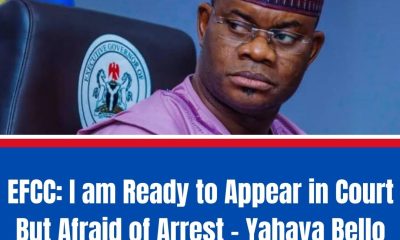
 Politics6 days ago
Politics6 days agoEFCC: I am Ready to Appear in Court But Afraid of Arrest – Yahaya Bello
-
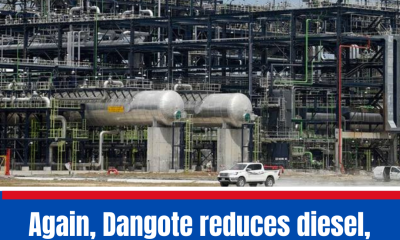
 Business6 days ago
Business6 days agoAgain, Dangote reduces diesel, aviation fuel prices to N940, N980
-
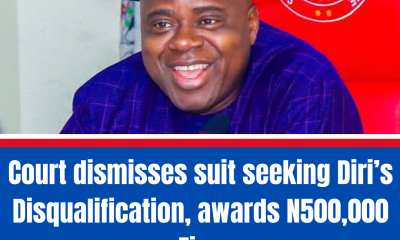
 Politics6 days ago
Politics6 days agoCourt dismisses suit seeking Diri’s disqualification, awards N500,000 Fine
-
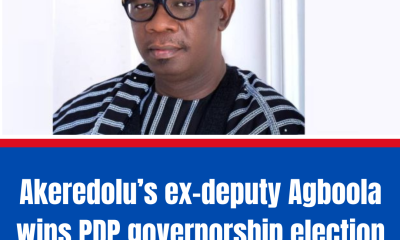
 Politics4 days ago
Politics4 days agoONDO 2024/ Akeredolu’s ex-deputy Agboola wins PDP governorship election primary.
-

 News3 days ago
News3 days agoWhy people do strange, incredible things for love – Psychologist
-
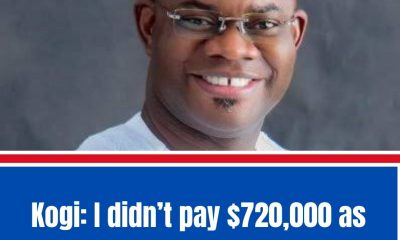
 Politics3 days ago
Politics3 days agoKogi: I didn’t pay $720,000 as school fees – Yahaya Bello
-
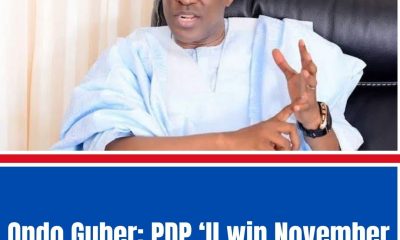
 Politics3 days ago
Politics3 days agoOndo Guber: PDP ‘ll win November election — Jegede




